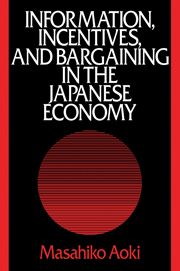 Information, Incentives and Bargaining in the Japanese Economy
Information, Incentives and Bargaining in the Japanese Economy Book contents
- Frontmatter
- Contents
- List of figures
- List of tables
- Preface
- 1 Introduction
- 2 The information structure of the J-firm
- 3 The ranking hierarchy of the J-firm as incentive scheme
- 4 Corporate finance, stockholding returns, and corporate governance structure
- 5 Bargaining game at the J-firm
- 6 The changing nature of industrial organization
- 7 Bureaupluralism
- 8 Culture and economic rationality
- Author index
- Subject index
- Frontmatter
- Contents
- List of figures
- List of tables
- Preface
- 1 Introduction
- 2 The information structure of the J-firm
- 3 The ranking hierarchy of the J-firm as incentive scheme
- 4 Corporate finance, stockholding returns, and corporate governance structure
- 5 Bargaining game at the J-firm
- 6 The changing nature of industrial organization
- 7 Bureaupluralism
- 8 Culture and economic rationality
- Author index
- Subject index
Summary
This book presents a microanalysis of the Japanese economy from the perspectives of information, incentive, and bargaining-game theories. It is not another parable of Japan's economic success.
Many people think that the Japanese economic system does not altogether fit the textbook model of the market economy. Is it because the Japanese economic system is culturally unique? Or is it that the textbook description is too simplistic for analyzing the rich reality of modern market economies of various types? In this book, I have sought to describe and explain the competitive workings of the Japanese microeconomic system in terms familiar to Western economists, although I have tried not to ignore entirely the possible impact of cultural factors.
In pursuing this goal, however, I have been compelled to examine critically some textbook notions about the microstructure of the market economy (e.g., hierarchy as the alternative to the market, the firm as a property of stockholders, market-oriented contracts as the incentive scheme, innovation as a direct application of invention, among others) that have strongly shaped and influenced the economists' approach to industrial organization. Although these notions constitute an appropriate foundation for the analysis of the highly market-oriented Western economy, it is necessary to go beyond those “specific” notions in order to arrive at a more complete understanding of the Japanese economy. At one level, therefore, this book may be regarded as a study of comparative industrial organization.
- Type
- Chapter
- Information
- Information, Incentives and Bargaining in the Japanese EconomyA Microtheory of the Japanese Economy, pp. xi - xiiPublisher: Cambridge University PressPrint publication year: 1988
